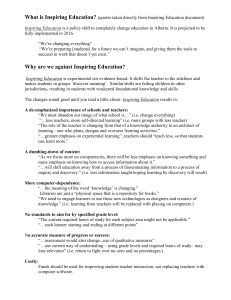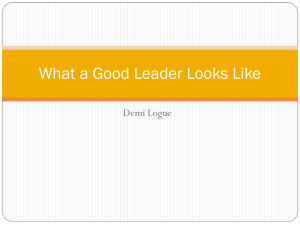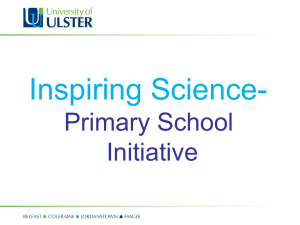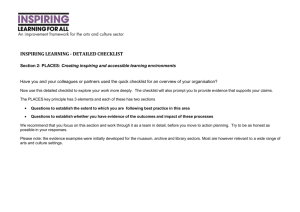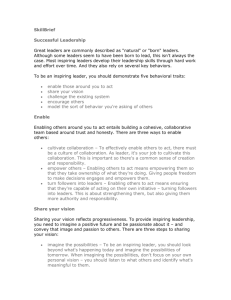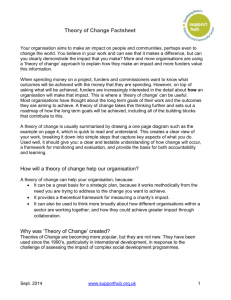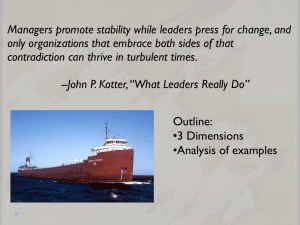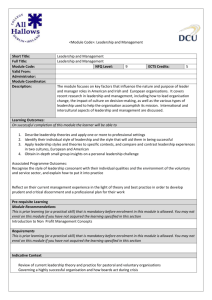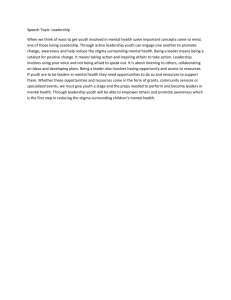report - Evaluation Support Scotland
advertisement
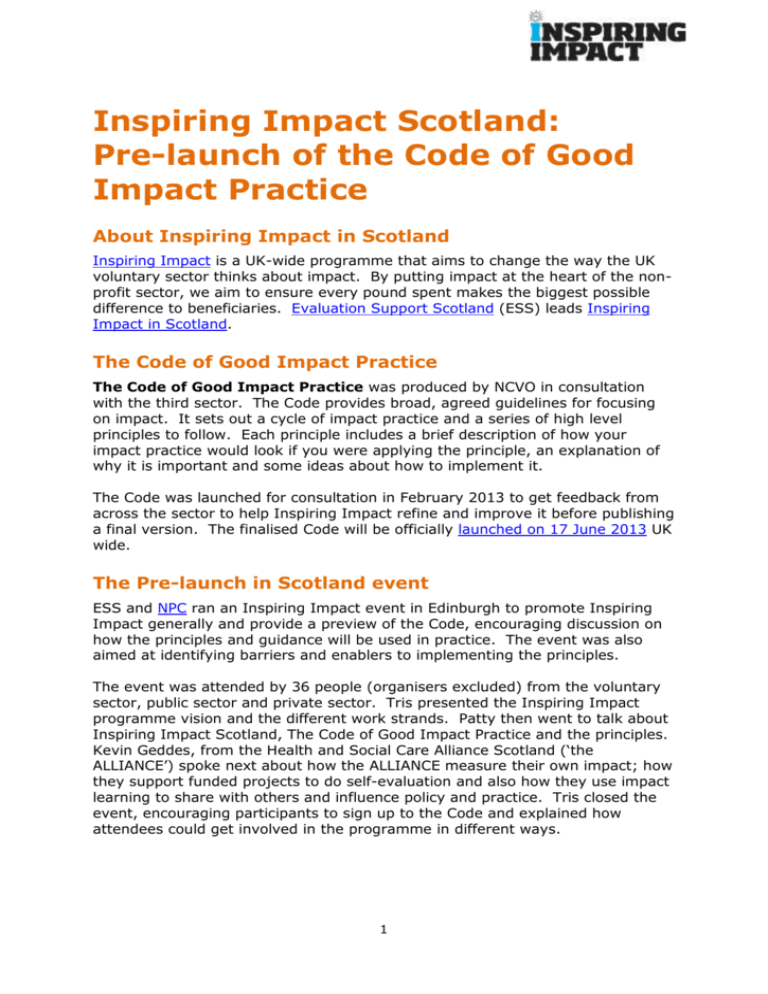
Inspiring Impact Scotland: Pre-launch of the Code of Good Impact Practice About Inspiring Impact in Scotland Inspiring Impact is a UK-wide programme that aims to change the way the UK voluntary sector thinks about impact. By putting impact at the heart of the nonprofit sector, we aim to ensure every pound spent makes the biggest possible difference to beneficiaries. Evaluation Support Scotland (ESS) leads Inspiring Impact in Scotland. The Code of Good Impact Practice The Code of Good Impact Practice was produced by NCVO in consultation with the third sector. The Code provides broad, agreed guidelines for focusing on impact. It sets out a cycle of impact practice and a series of high level principles to follow. Each principle includes a brief description of how your impact practice would look if you were applying the principle, an explanation of why it is important and some ideas about how to implement it. The Code was launched for consultation in February 2013 to get feedback from across the sector to help Inspiring Impact refine and improve it before publishing a final version. The finalised Code will be officially launched on 17 June 2013 UK wide. The Pre-launch in Scotland event ESS and NPC ran an Inspiring Impact event in Edinburgh to promote Inspiring Impact generally and provide a preview of the Code, encouraging discussion on how the principles and guidance will be used in practice. The event was also aimed at identifying barriers and enablers to implementing the principles. The event was attended by 36 people (organisers excluded) from the voluntary sector, public sector and private sector. Tris presented the Inspiring Impact programme vision and the different work strands. Patty then went to talk about Inspiring Impact Scotland, The Code of Good Impact Practice and the principles. Kevin Geddes, from the Health and Social Care Alliance Scotland (‘the ALLIANCE’) spoke next about how the ALLIANCE measure their own impact; how they support funded projects to do self-evaluation and also how they use impact learning to share with others and influence policy and practice. Tris closed the event, encouraging participants to sign up to the Code and explained how attendees could get involved in the programme in different ways. 1 Discussions After the presentation, we facilitated small group discussion on the Code principles. Attendees provided the following feedback from group discussion: 1. What ‘inspire’ you to come to the event? The participants said: 2. “They were excited and puzzled about the word ‘impact’; They were keen to see where evaluation is moving to; They were aware that measuring impact takes time and patience, and That impact measurement is a far-reaching change. What principles are you best at living up to? What principles do you find most challenging? Most felt they were best at: Principle 1 - taking responsibility for measuring impact and encouraging others to do so Principle 2 – Focus on purpose Principle 6 – Be honest and open Principle 7 – Be willing to change and act on what you find However, they felt they could get better at: Principle 3 – Involve others in your impact practice Principle 8 – Actively share your impact plans, methods, findings and learning Principle 4 – Apply proportionate and appropriate methods and resources Principle 5 – Consider the full range of the difference you make: positive and negative, planned and unplanned Some ideas people had to enable the principles: In relation to Principle 1, o Who takes responsibility? It should come from the top – e.g. Leaders, including senior management staff and Board. In relation to Principle 5, o Identify what outcomes and organisation can measure could help – focus on what your organisation does well rather than those it does badly. o Recognise that some outcomes are met in partnership o Unplanned outcomes are very important as some have been proven to create opportunities for organisations. In relation to Principle 8, 2 o o This is about finding the right ‘time’ to share information. Share learning throughout the project, not just at the end. Finding organisations that offer impact (or failure) competitions – ripple effect: demonstrating how great your organisation is will make getting funding easier. Could we have a ‘partnership award’? And more generally break down the following barriers: Funders, local authorities and government have different requirements and different drivers to require organisations to measure impact Using different language – ‘outcomes’ vs ‘outputs’ Funders not accepting unplanned outcomes in reports creates tension! How do you use the principles now? What helps you and hinders you? Feedback here focussed on practical support to evaluate within their own organisation and the benefits of peer learning events to enable organisations to share ideas. How Inspiring Impact can help Participants said that it’d be helpful for the Inspiring Impact programme to: Put examples of good impact practice on the II website Explore how funders/ intermediaries can work with frontline organisations to measure impact Consider that organisations use principles in different ways Organise more events with opportunities for people to meet face-to-face to discuss issues, such as ‘how could we measure impact more consistently?’ Share stories and case studies – people like them! Encourage enabling organisations to decide how to measure their impact – they are the experts! One organisation is one of many working towards outcomes – encourage sharing learning about methods, challenges and successes (e.g. Change Funds) Provide more self-evaluation guidance around quality control (vs independent/ external evaluation) – are we sending contradictory messages? Work with the media to enable organisations be more open about things that did not work or did not go to plan – culture change! Support organisations to grow strong to feel able to share negative impact, as well as positive Host ‘evaluation’ and/ or ‘failure’ competitions 3 Provide guidance on standards of evidence Promote the investment in value of evaluating a service Consider that organisations have different political agendas/ circumstances Encourage those who require impact evaluation (e.g. funders, social investors, government, etc) to do so purposefully (avoid hypocrisy) and feed it in decision making Encourage balance around time spent evaluating and time spent delivering interventions Encourage learning sharing throughout the life of projects – by the time you finish a project and want to share learning you have moved to the next thing Make it clear we are working on broad entry-level guidance and link to advanced discussion, for example around impact measurement in preventative work “We want to get involved!” At the end of the event questionnaire we asked attendees whether they would like to get involved in Inspiring Impact and provided options as to how to get involved. In summary: 33 people would like to get involved in Inspiring Impact. From these: 14 people would like to become an Inspiring Impact Champion 12 people would like to produce a case study and another would think about it. Potential total: 13 people 26 people would like to attend future seminars/ events and one more person would think about it. 18 people would like to complete surveys 28 people would like to sign up to the II Newsletter. Two have already signed up. “How did we do?” Most participants told us what they enjoyed the most was: Having time to reflect on impact practice (and realising that we are already doing a lot relating to the principles); Sharing experiences/ views; Meeting new people; Hearing stories about impact measurement; Sharing excitement about changes and working towards same goal, and Learning more about Inspiring Impact and plans in Scotland. Some specific comments were: “The best thing about today was … 4 An opportunity to continue dialogue and networking around good practice to measuring impact.” Sharing of experiences/ views.” Shared concerns about drivers for evaluation and complex landscape of politics and economics.” Overview of the work.” Realising we are already doing a lot relating to the principles.” Met an old colleague! And found out what is happening in the world of evaluation. Interesting.” From those who thought we could have done things better, some participants said: “The event was too short and could have done with more time more discussion.” “Could have provided more detail about the thrusts of the new code and examples of principles in action.” “For more opportunities for participants to move tables.” “Get a frontline organisation to give experience.” 5
